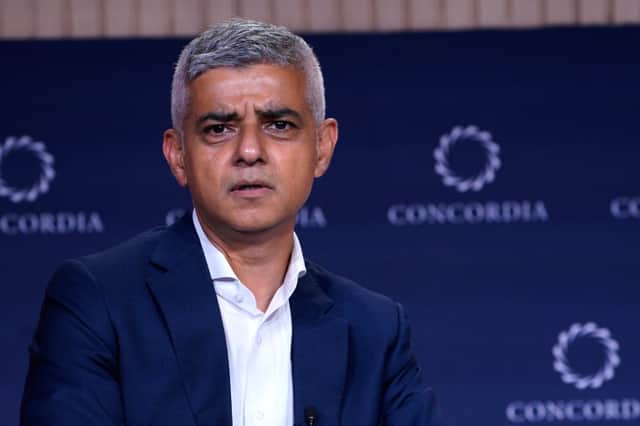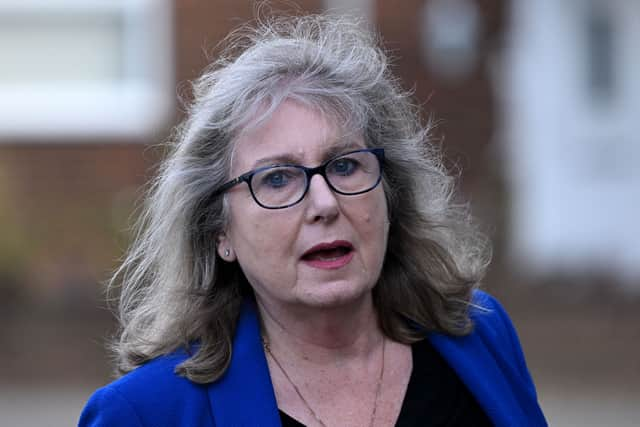ULEZ: Watch Sadiq Khan respond to criticism over air quality report publication
and live on Freeview channel 276
Sadiq Khan has come under fire after it emerged a report on the impact on air quality of the expansion of the Ultra Low Emission Zone (ULEZ) will not be published until after the election.
While a new City Hall report shows that roadside pollutant levels in London are falling faster than elsewhere in the UK, Transport for London (TfL) confirmed that a separate paper, showing the specific impact of ULEZ, will not be published before voters go to the polls on May 2.
Advertisement
Hide AdAdvertisement
Hide AdTory mayoral candidate Susan Hall accused the mayor of purposefully “hiding” the data from voters, but Mr Khan said strict pre-election rules were to blame. He said he was disappointed Londoners could not see the findings ahead of polling day.
The City Hall report released on Friday showed that roadside levels of nitrogen dioxide (NO2) pollutants fell by 49% in London between 2016 and 2023, and were lower last year in the capital even than in 2020, when there were extended periods of Covid lockdown.
The fall came despite London’s population having risen by more than a million people, the report said, and was a greater reduction than in England as a whole with 35%, Scotland 39%, Wales 31% and Northern Ireland 27%.
The report credits these improvements to a range of policies pursued by Mr Khan, including the ULEZ, and notes that ULEZ compliance among vehicles seen driving on an average day across London was at 95.8% as of December 2023 – up from 91.6% in June 2023 and 39% in February 2017.
Advertisement
Hide AdAdvertisement
Hide AdBut it says: “A longer period of time is required to assess the impact of the London-wide ULEZ [which launched on August 29, 2023] on air pollutant emissions and concentrations. Preliminary analysis of the air quality impacts will be reported in a London-wide ULEZ Six Month Report later in 2024, with a fuller analysis in a London-wide Ulez One Year Report in 2025.”
Alex Williams, TfL’s chief customer and strategy officer, told the Local Democracy Reporting Service that the "six month report" will be published in "May, [or] potentially June” of this year.
He said this was because the report required "a huge amount of analysis", including an independent peer review process by academics.
He added: “It’s not going to be pre-election, because of the pre-election period… but it will be as soon as we can after the election. It’s not us hiding it – it’s a really complicated piece of analysis.
Advertisement
Hide AdAdvertisement
Hide Ad“We know people will challenge the results, but that’s why it’s really important that we have peer review, to say actually these are robust [statistics], and we’ve gone through academic institutions.”


Conservative candidate Ms Hall suggested the mayor is purposefully keeping the data back to prevent voters from seeing it before casting their ballots.
She said: “We have had six months of Sadiq Khan’s disastrous ULEZ expansion hitting families, small business owners and charities with a daily charge they can’t afford.
“Sadiq Khan was told from the beginning that it would have a negligible effect on air quality, but he didn’t listen. Now he has decided to hide the air quality data until after the election, to avoid being proven wrong.
Advertisement
Hide AdAdvertisement
Hide Ad“It is a joke, but no one is laughing. I will listen to Londoners and scrap the Ulez expansion on day one of my mayoralty, no ifs no buts.”


Mr Khan rejected her claims, saying pre-election rules – due to kick in on March 19 – prevent any of the key findings from being published by TfL before May 2.
He pointed to the significant rise in ULEZ-compliance among vehicles across the capital and said that grants are still being distributed to drivers of non-compliant vehicles through his £210m scrappage fund.
Asked whether he regretted the fact that voters will not be able to see the data before the election, he said: “Oh of course – because the evidence from the past is, it’s a massive success. We’ve seen those who are hostile and anti-ULEZ in central London, were suddenly converts, because of the massive success. We’ve [seen] those in inner London who were opposing this, including Conservatives, opposed it, [and it was a] massive success in inner London.
Advertisement
Hide AdAdvertisement
Hide Ad“I’m confident it will be a massive success in outer London and that those who were previously cynical or were opposing this will be won over. All the evidence from the past two schemes is, they’ve been won over.”
Asked why it would not have been possible to do a report over a shorter span of time, in order for voters to see the results pre-election, Mr Khan said: “I think it’s because you’ve got to compare like with like, but also for the scientists and the experts, they want six months’ worth of data.
“But I’m sure you can speak to other experts from Imperial [College] and King’s [College] and they’ll tell you what the right amount of data is.”
Deputy mayor for the environment Shirley Rodrigues told a London Assembly meeting on Wednesday that she expects the six month Ulez report to show “amazing results”, when it is eventually published.
Advertisement
Hide AdAdvertisement
Hide AdShe also hinted that the scrappage scheme could have further funding, as she said the mayor is keeping the scheme “under review”.
Friday’s report showed that the number of air quality monitoring sites in the capital showing NO2 levels beyond the UK’s annual legal limit fell from 56 in 2016 to five in 2023.
Overall air pollution concentrations have fallen by 65% in central London since 2016, 53% in inner London and 45% in outer London over the period.